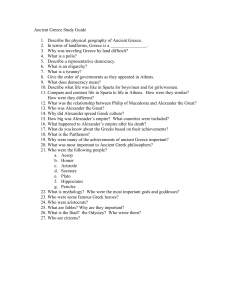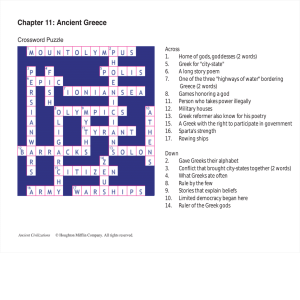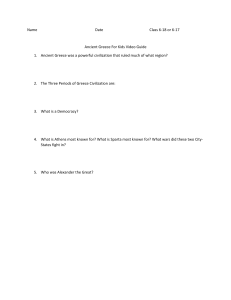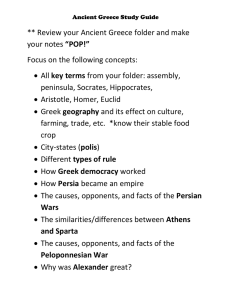Uploaded by
Elizabeth Pinder
Ancient Greece: Geography, Government, and Culture
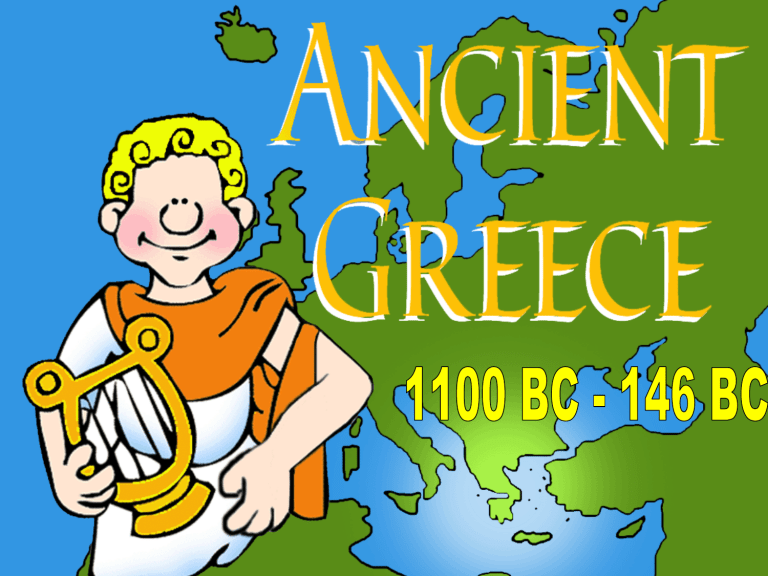
1 How did the geography of Ancient Greece effect the government of the civilization? 2 Ancient Greece Greece is a country in Europe. In ancient times, people lived along the huge 3 coastline where food was plentiful. New Towns The Ancient Greeks settled in areas around cities. Together, the city and the surrounding area was called a city-state. 4 The most famous citystates were Athens, Sparta, and Olympia. They each had their own laws and rulers. Olympia Sparta 5 At the center of each city-state was an acropolis. The acropolis is the place where men gathered to discuss politics and worship their gods and goddesses. 6 1-Minute Pause • 1 minute to think about the following: – 1 thing that you learned – 1 thing that you were interested in 7 city-state Category: Definition: Political Examples: Athens, Sparta, Olympia A city and the surrounding areas; have their own government & laws 8 acropolis Category: Definition: Political Examples: Parthenon The place where men went to discuss politics and worship their gods and goddesses 9 Athens & Sparta Pamphlet Directions Correctly Formed Pamphlet Title Page – Decorated (2 pictures – Athens; 2 pictures – Sparta) 3 Differences on Venn Diagram 3 Similarities on Venn Diagram Completed Paragraph with Valid Reasons Size Spelling & Grammar Colored (No Marker; No Pencil) Neatness 10 Power Thinking Review P1 – Ancient Greece P2 – P3 – P4 P3 – P4 – P3 – P4 11 What was the responsibility of a citizen in Athens? Who was a citizen in Athens? 12 Government The city-state of Athens developed a form of democracy. 13 The word democracy means “rule by the people”. In a direct democracy, all of the citizens vote to make the laws. 14 The direct democracy of Athens is similar to what the United States bases part of their government on today! In the US, there are times when our citizens vote directly for laws. 15 direct democracy Definition: Government where citizens vote on laws Category: Political Examples: Athens 16 1-Minute Pause • 1 minute to think about the following: – 1 thing that you learned – 1 thing that you were interested in 17 Power Thinking Review P1 – Ancient Greece P2 – City-States P2 – Direct Democracy P3 - 18 What united the Greek citystates? 19 Religion The Ancient Greeks worshiped and believed in many gods and goddesses. 20 The Ancient Greeks wrote myths, or stories, that explain the origins of the world and details the lives and adventures of their gods and goddesses. 21 Zeus- king of the gods. Most powerful god. Would hurl his thunderbolt if he was angry. 22 Poseidon- god of the sea. Has control of the waves and oceans. Brother of Zeus. 23 Hera- The queen of the gods. Wife of Zeus. Goddess of marriage, children, and the home. 24 Aphroditegoddess of love and beauty. 25 One-Sentence Summary ______________ and ____________ are similar in that they both _______________, but ______________ while ___________. 26 Greek Myth Book Directions Title Page – Decorated Identify the correct information from the myth (Title, Characters, Setting, Point of View, Conflict) Scene from Each Myth Size of Picture Colored (No Marker; No Pencil) Neatness Spelling & Grammar 27 One-Sentence Summary “Jason and the Golden Fleece” begins with __________, then __________ happens, and it ends with _________. 28 One-Sentence Summary _____________ happens because ____________. 29 One-Sentence Summary ______________ wanted _________, but _________, so ___________. 30 Power Thinking Review P1 – Ancient Greece P2 – City-States P2 – Direct Democracy P2 - Religion P3 – P4 – P5 P4 – P5 – P4 – P5 - 31 • The first Olympic Games were held in 776 B.C. in the city-state of Olympia. 32 • During the first Olympic Games there was only one event, the stadion. The stadion was a short sprint that lasted the length of the stadium. 33 • Over the years many other events were added to the Olympic Games. – Boxing – Wrestling – Pankration (Martial Arts) – Chariot Racing – Pentathlon 34 • Participation in all athletic events during the Ancient Olympic Games was limited to males only. Sorry girls! 35 • Champions were awarded an olive branch from a tree that was dedicated to the king of the gods, Zeus. All champions were viewed as heroes for the rest of their lives. 36 • The Olympic Games were not held just for the athletic events. The spectators and the athletes spent most of their time worshipping and honoring the gods. 37 One-Sentence Summary I was surprised that ________________. 38 Sentence Synthesis Use two of the following sentence: Women gods Men Four Years words in one Pankration Chariot Racing Olympia Olive Branch *Your sentence must show meaning! 39 Greek Olympic Art • The Ancient Greeks painted images of important events on their pottery specifically the Olympics. 40 Picture of 1 of the Following: Olympic Events (Chariot Racing, Wrestling, Pentathlon, Boxing, Pankration, Stadion) Size of Picture & Decorated Sides Neatness Colored (no marker) Spelling & Grammar Answer in 1 paragraph: Which Ancient Olympic event would you most like to compete in? Why? 41 Power Thinking Review P1 – Ancient Greece P2 P2 P2 P2 – City-States – Direct Democracy – Religion - Olympics P3 – P3 – P3 – P3 – P4 P4 – P4 - 42 How did Greek culture spread to other areas of the world? 43 Alexander the Great • Alexander the Great was NOT Greek. He was a prince that was born in Macedonia. 44 Why is he important to Ancient Greece? • Although Alexander was not Greek, he was taught by a Greek philosopher, Aristotle. • Aristotle taught Alexander to respect the Greek culture. Alexander spoke Greek, knew Greek history, and believed in the Greek gods. 45 • As King of Macedonia, Alexander’s main job was to expand his kingdom. Alexander spread Greek culture to all lands that he conquered. • It is believed that he would have extended the Macedonian kingdom to China if he had not 46 died at a young age. Alexander the Great Definition: Macedonian who conquered Greece and spread their culture Category: Political/Culture 47 Power Thinking Review P1 – Ancient Greece P2 – City-States P2 – Direct Democracy P2 – Religion P2 - Olympics P2 – Direct Democracy P2 – Alexander the Great P3 – P3 48 1.Write each letter of the alphabet. 2.Write one word or phrase related to Ancient Greece for each letter of the alphabet. (Hint: You can use examples for your letters.) 49
